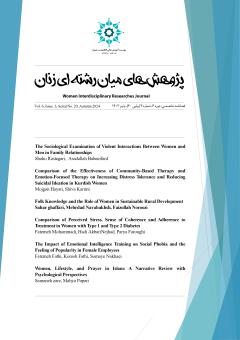Folk Knowledge and the Role of Women in Sustainable Rural Development
Subject Areas :
Sahar ghaffari
1
![]() ,
mehrdad Navabakhsh
2
,
Faizollah Noroozi
3
,
mehrdad Navabakhsh
2
,
Faizollah Noroozi
3
1 - PhD Student in Sociology, Rural Social Development Orientation, Islamic Azad University, North Tehran Branch, Tehran, Iran.
2 - Assistant Professor, Department of Sociology, Science and Research Branch, Islamic Azad University, Tehran, Iran.
3 - Faculty Member and Assistant Professor, Department of Sociology, Science and Research Branch, Islamic Azad University, Tehran, Iran.
Keywords: Sustainable Development, Women, Rural Areas, Development, Folk Knowledge.,
Abstract :
Can folk knowledge and women in rural communities serve as catalysts, significantly contributing to achievement of sustainable development, or conversely, delay this process? The present study, as a "short report article," aims to examine and clarify the role of women and folk knowledge in sustainable rural development by investigating the economic conditions, employment, and agricultural products in 30 villages of South Khorasan Province. Drawing on Durkheim's theory of the division of labor—offering a distinctive perspective that contrasts with the principles of modernization theory in explaining developmental barriers—this study adopts a qualitative approach. Data were collected through document-based, using content analysis as the primary technique. Findings from studies conducted in these villages reveal a meaningful relationship between folk knowledge and sustainable rural development, as well as the significant role of women. Durkheim’s theoretical classification of societies demonstrates the progression of communities rather than the backwardness of primitive societies as an obstacle to any form of development.
1- اینگلهارت، رونالد(1373). تحولات فرهنگی در جامعه پیشرفته فرهنگی، انتشارات امیرکبیر: تهران.
2- اکبری، حسین(2013). نقش زنان در توسعه پایدار محیطزیست. زن در توسعه و سیاست، 10(4)، 27-56.
doi:10.22059/jwdp.2013.30574
3- خرمشاهی، بهاءالدین(1372). دینپژوهی. موسسه مطالعات و تحقیقات فرهنگی، تهران.
4- چیتامبار، جی بی(1373). مقدمهای بر جامعهشناسی با تأکید بر جامعهشناسی روستایی. ترجمهی احمد حجاران و مصطفی ازکیا، نشر نی، تهران.
5- دورکیم، امیل(1382). صور ابتدایی حیات مذهبی. ترجمهی نادر سالارزاده و خدامرد فولادی. انتشارات دانشگاه علامه طباطبایی، تهران.
6- راودراد، اعظم(2000). تحلیلی بر نقش زن در توسعه با تأکید بر اشتغال. نامه علوم اجتماعی، 15(15).
7- روحالامینی، محمود(1387). گردشهر با چراغ در مبانی انسانشناسی، انتشارات عطار: تهران.
8- فرهادی، مرتضی(1380). آیا کشاورزی ایرانی بدوی است؟. اقتصاد کشاورزی و توسعه، 9(35)، 233-256.
9- لمتون، کاترین(1345). مالک و زارع در ایران. ترجمه منوچهر امیری، بنگاه ترجمه و نشر کتاب، تهران.
10- ماسه، هانری(1357). معتقدات و آداب ایرانی. ترجمهی مهدی روشنضمیر، انتشارات دانشگاه. تبریز.
11- نوابخش، مهرداد(1400). نظریات توسعه و کارآفرینی اجتماعی، جامعه¬پژوهان بُرنا: تهران.
12- همیلتون، ملکم(1387). جامعهشناسی دین. ترجمهی محسن ثلاثی، نشر ثالث: تهران.
13- خاکپور، باوان پوری(2009). نقش سرمایهی اجتماعی در توسعهی پایدار محلهای (نمونه: کوی سجادیه مشهد). جغرافیا و توسعه ناحیهای، 7(12). doi:10.22067/geography.v7i12.8928
14- ذوالفقاری، حسن(1393). متن شناسی عقایدالنساء یا کلثوم ننهی آقا جمال خوانساری. متن¬پژوهی ادبی، شماره 59، صص26-27.
15- ربیعی، کامران(2015). توسعه اجتماعی ـ اقتصادی و تأثیر آن بر تلقی افراد از چیستی خرافات مطالعه موردی: شهرستانهای استان اصفهان. جامعهشناسی کاربردی،26(4)، 129-148.
dor:20.1001.1.20085745.1394.26.4.7.7
16- سفیدگر شهانقی، حمید(1386). توسعه فرهنگی در باورهای عامیانه مردم آذربایجان. نجوای فرهنگ، 4(1).
17- علیزاده، مرجان(1389). نقش اشتغال زنان در توسعه. نشریه دانشگاه آزاد اسلامی،2(5)، 59-49.
18- فعلی، سعید؛ صدیقی، حسن؛ و میرزایی، آرزو(1389). چالشهای جوامع روستایی ایران برای دستیابی به توسعه پایدار. نشریه روستا و توسعه، 4(13)، 128-97.
19- مسعودی، فریبا؛ و کتابی، محمود(1398). تقابل عقلانيت و خرافه گرايي در مسير توسعهیافتگی_ با تأکيد بر ايران دوره قاجار. نشریه راهبرد اجتماعي فرهنگي، 8(30)، 297-265.
20- Herman, E. (2012). Rural employment in the context of Romanian regional development. Annals of the Constantin Brancusi University of Targu Jiu, Economy Series, 3, 131-140.
21- Tudor, M. M. (2012). Rural Human Capital In Romania–Evolutions In Transition. Agricultural Economics and Rural Development, 9(2), 211-232.
22- Borec, A., and Turk, J., (2009), Sustainable Rural Development – Eu AgricalturePerspective, Revija za geografijo - Journal for Geography, Vol. 4, No. 1, PP. 37-52. doi:10.18690/rg.4.1.3148
23- Chinchanachokchai, S., Pusaksrikit, T., & Pongsakornrungsilp, S. (2017). Exploring different types of superstitious beliefs in risk-taking behaviors: What we can learn from Thai consumers. Social marketing quarterly, 23(1), 47-63. doi:10.1177/152450041667243
24- Chigbu, U. E. (2012). Village renewal as an instrument of rural development: Evidence from Weyarn, Germany. Community Development, 43(2), 209-224. doi:10.1080/15575330.2011.575231
25- Herrmann, S. and Osinski, E, (1999), Planning sustainable land use model in rural areas atdifferent spatial levels using GIS and modeling tools, Landscape and Urban Planning 46(1),pp. 93-101.
26- Douglas, M. Natural Symbols: Explorations in Cosmology (London: Barrie & Rockliff, 1970); Mary Douglas,“Cultural Bias,”. In the Active Voice.
27- Matthews, K.B. and Sibbald, A.R., and Craw, S, (1999), Optimization algorithm, Computersand Electronics in Agriculture, No 23, pp. 9-26.
28- Rodrigue, J.P., (2009), Sustainable Development, Dept. of Global Studies & Geography,Hofstra University.
29- Wackernagel, M. and Yount, J.D., (2000), Footprints for Sustainability, Vol. 2, No. 1, PP.23-44.
30- Ward, N,. Brown, David L, (2009), Placing the Rural in Regional Development, RegionalStudies, NO 43, PP. 1237–1244.
31- Zebb, B. J., & Moore, M. C. (2003). Superstitiousness and perceived anxiety control as predictors of psychological distress. Journal of anxiety disorders, 17(1), 115-130. doi:10.1016/S0887-6185(02)00176-7


